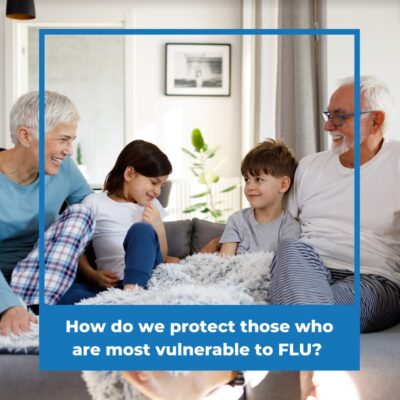
How Do We Protect Those Who are Most Vulnerable to Flu?

Right now, seasonal flu is elevated across the country. Protecting yourself and your loved ones is incredibly important. You may have heard from friends and family (or seen on social media) that someone in their family is sick with the flu. While everyone is susceptible, it can be especially dangerous for certain age groups and people with chronic conditions.
Children Under 5
The youngest in our communities need to be protected. Children younger than 5 years old–especially those younger than 2–are at higher risk of developing serious flu-related complications. Flu illness is more dangerous than the common cold for children. Approximately 20,000 children under the age of 5 are hospitalized each year from flu and over 2,000 children have lost their lives to flu since 2004. Talk to your healthcare provider about special vaccination instructions to make sure your kids are protected from the flu.
Seniors (65+)
In addition to the youngest community members, people 65 years and older are at higher risk of developing serious complications from the flu compared to young, healthy adults. Changes in immune defense increase with age so there is increased risk to those 65+. During recent flu seasons, people 65+ account for 85% of flu deaths and 70% of flu-related hospitalizations. Because this age group bears the greatest burden during more flu seasons, it is imperative they get vaccinated.
Pregnant Women
During pregnancy, changes to the immune system, heart, and lungs can make people more susceptible to potentially serious flu complications. In addition, flu may also be harmful to a developing baby. Getting vaccinated during pregnancy can help protect a baby from the flu during the first several months after birth. The pregnant parent passes antibodies on to the developing baby during pregnancy. Since infants can’t receive a flu vaccine until they are six months of age, getting a flu vaccine during pregnancy is the best way to pass on protection to your newborn. A new study shows that pregnant people who received a flu vaccine had a lower risk of having certain negative birth outcomes.
Chronic Conditions
People with asthma, heart disease, a history of stroke, diabetes or any number of chronic conditions are at higher risk of developing potentially serious flu complications. Those complications can result in hospitalization or even death. In fact, during recent flu seasons 9 out of 10 people hospitalized with flu had at least one underlying health condition. Learn more about the connections between flu and asthma, diabetes, heart disease, lung disease, cancer and neurological conditions.
What’s the one thing we can all do to help protect these vulnerable populations? Get vaccinated!
When we choose to get the influenza (flu) vaccine, we’re protecting not only ourselves but those who need the protection most. It is never too late to get your flu vaccine; talk to your healthcare provider today if you have not been vaccinated yet. Let’s all do our part to keep everyone healthy so we can enjoy the new year.


